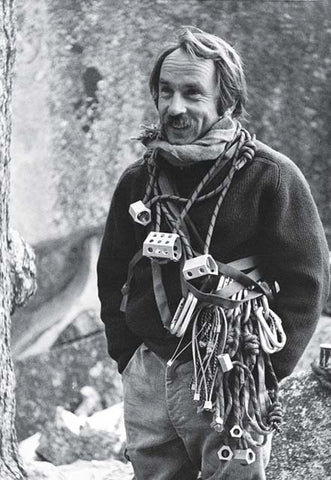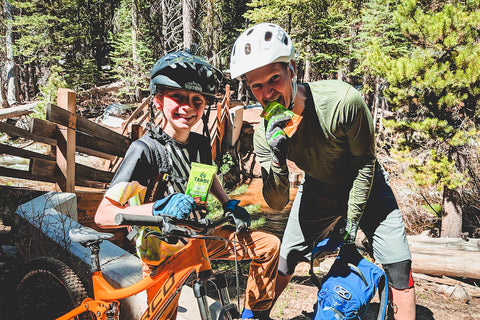
It’s the most satisfying feeling finishing up a long hike, knowing that there’s a meal in your future. After snacking on nuts and dried fruit all day, and burning loads of calories, a hot meal sounds especially appealing.
And you deserve it! There are certain foods, however, that aid in the post-hike recovery period better than others, and will make you feel better.
The hike itself may end at the trailhead, but the impact it has on your body lasts longer. In this post, we’ll tell you the best foods to eat after a long hike, as well as before and during a hike. If you're more into cycling, we have a post for you on the best energy bars for cycling.
What to Eat Before a Hike
Eating properly right before embarking on a long hike, and even the day before, can make a huge difference. The day before a hike, consider incorporating more carbohydrates into your meals to increase glycogen levels.
Your body turns sugar into glycogen, which it then stores in your muscles and liver. Increasing glycogen stores by eating more carbohydrates helps you maintain your endurance. Make sure your pre-hike meal contains complex carbs.
The following is a list of what to eat before a hike:
- Oatmeal: This is one of the best pre-hike breakfasts because oats take longer to break down than refined carbs, slowly releasing energy as you hike.
- Eggs: This is ideal to have on the side if you prefer a heartier breakfast. Just don't go overboard with the protein. Exercise physiologist Aimee Layton suggests that you limit protein before a workout, as “protein requires a large amount of water to digest, which can lead to dehydration and muscle cramping”. Protein intake is important after a hike, but we’ll get to that later.
- 20 to 32 oz of water: This will help you get a head start on hydration. Make sure you pack plenty of water to last you throughout the entire hike. If there’s no water at the trailhead, leave a bottle of water in your car for some post-hike hydration.

What to Eat During a Hike
Like breaking in your hiking boots, packing enough food and water on a hike makes a difference for whether or not you’ll have a good time.
The following is a list of what to eat during a hike:
-
Energy bars: These are the best trail snack because they are portable and packed with nutrients to keep you going. Especially vegan energy bars. Snack regularly while you’re hiking, even if you don’t feel hungry yet — your body will thank you later.
-
Water: taking frequent, small sips of water will benefit you more than chugging a water bottle when you start feeling thirsty. Aim for about 32 oz of water per 2 miles. And if you’re in a hotter climate, you might have to drink even more water.
What to Eat After a Hike
While it might seem like the before and during parts of a hike are the most important aspects, think again.
Depending on the terrain of your hike and how many miles you went, hikes take a lot out of you! The good news is that you have an excuse to eat lots of good food to help your body recover.
After a hike or any type of intense exercise, it’s smart to fuel up on protein, complex carbohydrates, and foods with vitamins and nutrients.
Be sure to eat a snack or meal within one hour of ending your hike. If you have a long drive home from the trailhead, we recommend tiding yourself over with a protein energy bar (see some benefits of protein bars). Then, you can treat yourself to your favorite meal (make sure it has protein), or try out one of these foods that will speed up your body’s recovery even more:
The following is a list of what to eat after a hike:
- Salmon: A long, intense hike can be taxing on your muscles, but protein aids in your body’s recovery. The protein we eat gets broken down into amino acids, which then supplies the nutrients essential for muscle recovery on a cellular level. Having sore muscles after an intense hike can feel rewarding, but it’s also a sign that our body needs protein. Salmon is a great source of protein, and as a bonus is a source of omega-3 fatty acids, which help tone down inflammation and can ease joint pain. Enjoy a bagel with lox and cream cheese for a delicious carb and protein packed meal.
- Bananas: Bananas are naturally rich in potassium, calcium, and magnesium, which are essential nutrients that can help ease muscle cramps. Their carb content also helps us to restore our glycogen stores, which we may have depleted while hiking. For a protein boost, pair your banana with some peanut butter or a handful of nuts.
- Turmeric: Incorporating turmeric into your post-hike diet can also help reduce inflammation that may result from exercise. You can cook with turmeric, or make some delicious golden milk.
While those are some of the highlights, here are more ideas for ways to incorporate protein, complex carbohydrates, and healthy fats:
Protein
- Chocolate milk
- Cottage cheese
- Eggs
- Greek yogurt
- Lean meat or fish (i.e. turkey, chicken, tuna)
- Tofu
- Nut butter
Complex Carbs
- Whole grain pasta
- Chia pudding
- Fruit
- Quinoa
- Sweet potatoes
- Whole grain bread
Healthy Fats
- Nuts/nut butter
- Avocado
- Coconut oil
- Flax seeds
Our last piece of advice for your post-hike recovery process is to catch up on hydration before you start drinking alcohol.
Replenish your water stores (you’ll probably need to drink more water than you think, especially if it was a hot day), and then you’re free to celebrate your mountain summit with a beer.
Feel free to incorporate some of our recommended foods into your post-hike diet — or not!
After conquering difficult switchbacks, you deserve to treat yourself to your favorite food.
One of the most satisfying things is to manifest the meal you may have been thinking about on the trail for the past six hours.
For some reason, food always tastes so much better after a hike. Plus, your body knows best — if you depleted your nutrient stores on a hike, your body will let you know by craving certain foods containing those nutrients. So, as always, trust your gut!
Featured image credit: Photo by Toomas Tartes on Unsplash




